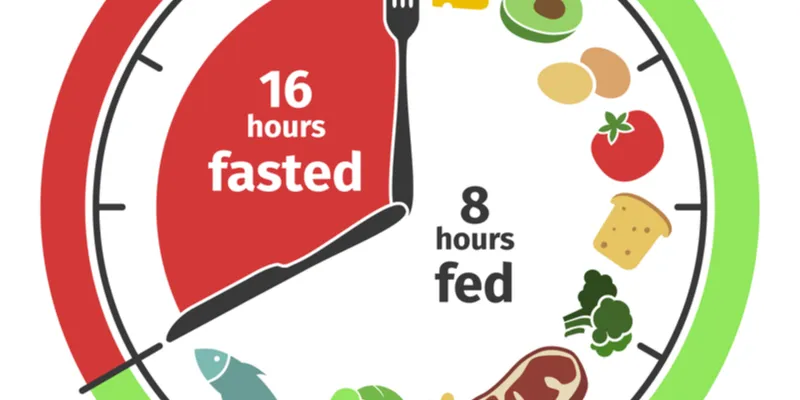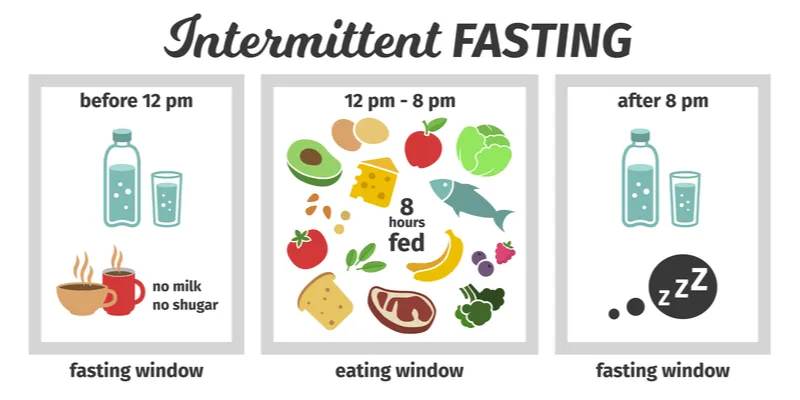Two meals a day: Here’s why intermittent fasting can be good for you
Most of us have grown up eating three meals a day, but ever since the concept of intermittent fasting became popular, it has become one of the most popular diets in the world. But is it beneficial for everyone? Our nutritionist has some tips that you can follow…
Many decades ago, I remember my family eating two major meals in a day. The first meal was brunch which was eaten at ten in the morning followed by some buttermilk in the peak of the afternoon and finally an early dinner by 5.30 or 6 p.m.
When I first went and stayed in an ashram for yoga training twenty years ago, we had a heavy brunch at 10am and a fairly heavy dinner at 6pm. The ashram was quite clear about not wanting us to eat anything in between. This has been the practice in many ancient cultures, which has translated into what is the very popular food philosophy today - intermittent fasting.
Can you survive on just two meals?

People can thrive by following a diet that involves intermittent fasting
Not only can you survive on just two meals, but you can actually thrive. Here’s where it gets interesting. Two very popular nutrition philosophies today in India, advocate for two opposing thoughts. One advises intermittent fasting, and the other advises eating every two hours.
Both philosophies have benefits and disadvantages. We’ll get into the two-hourly diet at some point in time, but is intermittent fasting ideal? How do you know if intermittent fasting will work for you? What are the benefits? What can be the potential pitfalls? Does it work for you all the time? Does it work for everyone?
What are the benefits of intermittent fasting?

Intermittent fasting offers incredible benefits if practised the right way
I like to look at the benefits before the challenges, and the truth is that intermittent fasting can be a wonderful way to reconnect to ancient roots and traditions. The benefits are remarkable, and more and more research is being done to identify how it might be used as a therapeutic tool to deal with systemic health challenges and conditions.
- Autophagy or cell death of bad cells is one of the wonderful benefits of intermittent fasting. Your body has an innate intelligence to actually eat up the weak and poor cells first, when it does not have food. This means that you can help initiate autophagy as a programmed cell death of damaged and worn out ones, helping to optimise cellular activity.
Autoimmune cells get replaced in the process of autophagy. When your body starts to eat up the old cells and imitate autophagy, over time, it also replaces autoimmune cells, making it an excellent approach to attack autoimmune conditions.
- Raises stem cells over time. In longer fasts, your body starts to create new stem cells, and therefore it allows you to boost cellular activity, fight ageing and improve energy overall.
- Produces ketones. Ketones are produced in the liver in fasting or in low carbohydrate diets, and your body then starts to use ketones as a source of fuel instead of glucose. Your brain loves ketones. Beyond all the benefits of ketones, is the positive impact to your brain.
Diverts digestive energy to deeper healing. Contrary to the belief that food provides energy, which is true partially, when you rest the digestive system during intermittent fasts, you divert energy used for digestion to deep cellular healing.
- Resets DNA. Fasting can actually reset your DNA and help substantially in conditions where you have a genetic predisposition.
Resets your microbiome. Your gut lining replaces itself during fasts. In three days, it can repair itself of damage to the lining. It resets the microbiome which is the ecosystem of bacteria within you, allowing for starvation of pathogenic bacteria such as yeast. Since dysbiosis is the root of many conditions, it can be deeply supportive to the healing journey.
- Optimises many hormones. Your entire endocrine system can slowly shift and start to work more synergistically.
If there are so many benefits to intermittent fasting, isn’t it possibly the best diet for you during these challenging times?
Can intermittent fasting cause any problems for you?

A long fasting window does not give you the licence to binge eat
Fasting can cause you to feel licensed to eat anything. Often times, I see people who practise intermittent fasting with a long fasting window, only to binge eat during the feeding window. This can actually be harmful, given that your body neither can tolerate nor requires massive amounts of food after fasting. You need to combine intermittent fasting with a healthy diet that is fairly low in sugar and starch, and higher in fibre, fat, protein and vegetables.
- Intermittent fasting can elevate cortisol in your body, if you have adrenal dysfunction. If you struggle with managing stress and with sleep, this is not the ideal time to begin intermittent fasting. The first step might be to first eat a more balanced diet and find ways to improve sleep, before you move towards that. Adrenal issues can worsen if you begin your health journey with intermittent fasting. It can also disrupt sleep, and make you feel wired at night but lethargic in the morning.
Blood sugar imbalance can get worse. If you have blood sugar imbalance or insulin resistance, intermittent fasting can be very challenging. This does not mean it will not benefit you. In fact, it can be what you need, but you might first need to eat more quality proteins and healthy fats, improve satiety overall, and reduce blood sugar imbalance symptoms like frequent hunger or headaches with late meals.
- Since hormones can get disrupted in women, intermittent fasting is not favoured by the best women’s health experts in functional medicine, except in some phases of the menstrual cycle such as after your period. This really depends. If you have challenges with your cycle, intermittent fasting is not the diet for you. If you have no challenges, you could try it.
Can worsen GERD and reflux. The adaptation phase of intermittent fasting can cause more havoc to hyperacidity. If you can find a way to get through that initial phase with a dry fast, it can help the mucosa to heal and help adjust to intermittent fasting quickly.
- Mental problems can worsen at times. If you struggle with anxiety, intermittent fasting is not right for you now. It can trigger adrenal dysfunction and heighten anxiety.
Check what works for you

Intermittent fasting programmes may not suit everyone
If you do try intermittent fasting and it works for you, it can offer you remarkable benefits. It can actually improve energy levels.
But you do need to ask yourself a few questions. Have you become more stressed, angry or weepy? Has your sleep improved or worsened? Do you feel more energy or times of fatigue? Have any symptoms become better or worse? If over a month, everything starts to improve, then it is great!
If not, it just means that you need to begin with a healing diet. Identify what is causes inflammation in your body and avoid it.
You have to recognise any hidden deficiencies. Make sure that your diet is as diverse as possible. Try and recognise the weaker systems within. See that you have sleep and blood sugar balance dialled in.
Don’t try any diet until you are stress free and symptom free.
Edited by Asha Chowdary
(Disclaimer: The views and opinions expressed in this article are those of the author and do not necessarily reflect the views of YourStory.)









